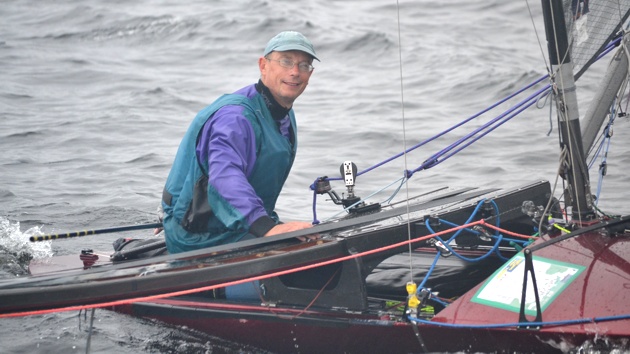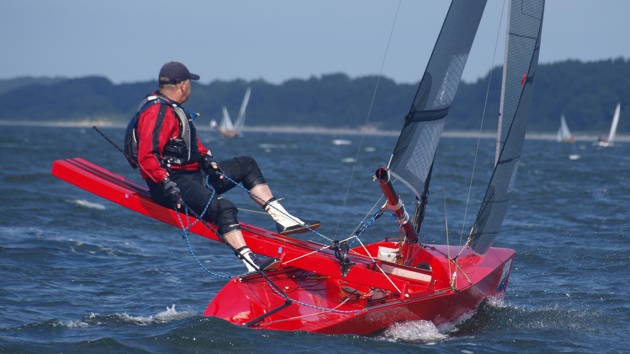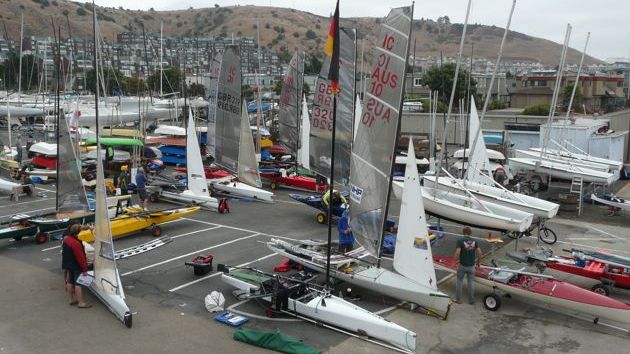International Canoe Worlds 1987
Mayflower SC, Plymouth, UK
Sixty-one International Canoes from seven countries competed for the 1987 World Championship under the burgee of the Mayflower Sailing Club based on the shoreline of the ancient naval city of Plymouth. We were fortunate to have support from the Sports Council and practical assistance in innumerable ways from the highly energetic City of Plymouth Marketing Bureau as well as invaluable help from our own staff at Addlestone both before and during the Regatta.
In a week of fitful winds and sloppy seas outside the breakwater of Plymouth Sound, in the open English Channel, Robin Wood of Llandegfed Sailing Club sailed the series with uncanny consistency to take the title from one of the youngest competitors in the fleet, Lars Guk of the United States. Another Briton, Pat Marshall of Hayling Island bettered his fourth in the previous Worlds by a coming a close third. When looking closely at the complete list of results it becomes apparent that although the two British and one American filled the medal positions the Swedish team did well in overall terms with 7 places in the top twenty, the same as the British and one more than the Americans.
It has been a long hard road for the British Fleet towards the final destruction of Swedish and more recent American domination of international competition in the IC - not since 1969 when the great Alan Emus took his third successive title has a Briton stood on top of the medal rostrum. Ls in the previous Worlds at Angelholm, Sweden in 1984 the Americans had cleaned up, putting four of their team in the first six places; similarly the Swedes had dominated the 1986 Europa Cup so both teams arrived at Plymouth in confident mood.
with light winds throughout the week one would have expected the Americans to have shown a superiority similar to that shown at Angelholm. The first race shattered many cherished illusions with five of first six places taken by British boats in the light southerly breeze; Simon Allen of Medway and Blue Circle led around the windward mark followed by David Marrs of Hayling and Robin. The wind was shifting in a pretty unpredictable fashion and it was Robin demonstrating his skills in reading the variations who took the winning gun followed by David and Pat Marshall who had fought his way into the reckoning from seventh place at the first mark.
The second day’s racing saw a stronger and steadier breeze from the west and the emergence of the Swedish trio that showed so much performance at Rock; Ronnie Carlsson led throughout the race but on the final tack he allowed Olle Berqvist to break cover and drive up under his lee to take the gun. Poor Ronnie, he must be getting fed up with Olle sneaking past at the last moment, he lost the 86 Europa Cup on the final beat of the final race to Olle. (However, this time Ronnie was awarded equal points with Olle on application under Rule 69 - "Request for Redress"- Editor). The 81 World Champion, Max Tollqvist, also of Sweden and the defending Champion, Steve Clark, of the United States had a battle royal for third place with Robin Wood in a solid sixth place.
If any of the Swedes or Americans thought that a stronger breeze would put paid to Robin’s chances the result of the third race settled any arguments Having rounded the first mark ahead he assumed complete control of the race, covering Steve Clark and Kjell Pettersson of Sweden carefully to take his second winning gun of the week and an undisputed lead in the overall points. Simon Allen was fourth.
The next race started back to back with the third, the wind which peaked at force 4 between the races started to die as soon as the contest commenced. Clark with the Swedes, Tollqvist, Osterlund and Pettersson snapping at his heels, led early on but he could not prevent first one then another overtaking as the breeze faded; the arrival of Wood and Marshall among the leaders at the end of the second lap saw Clark in sixth at the finish. Eventually Tollqvist won with Osterlund and Wood next.
At this stage of the series several top competitors had effectively blown their chances by having more than one poor result in their tally; in the final count Tollqvist and Bergvist would have to carry 14th places, Carlsson a 17th and Marrs a 26th after discarding even worse places. others including Clark. with a 22nd, Marshall with a 33rd and Allen with a retired could not afford to put another foot wrong. Robin, however, had not scored lower than sixth.
Light winds and three recalls were the name of the game on the fourth day of racing; Lars Guk, who had finished steadily in the lower half of the top ten suddenly went into overdrive, winning impressively from Berqvist and Carlsson with the ever present Wood in fourth place. Steve Clark must have been feeling a little sick since Lars was sailing "Grey Matter" in which Steve had won the Angelholm Worlds. Steve finally blew his chances of retaining his crown by taking a l7th in this race which he would still have to count, after discard, in his final total.
The sixth and, as it turned out, final race to be run saw the British in rampant mood once more. With the race two thirds run and Wood in a secure lead, the wind shifted ninety degrees necessitating an abandonment and restart. Although Robin only had to finish in the top ten it must have crossed his mind that this might be the cruel hand of fate trying to prevent him from taking the Championship which he had all but won. At the second attempt it was Pat Marshall who led away from the first mark with Chris Powles, also from Hayling, following - indeed, Chris managed to sneak past Pat on the downwind leg to take the lead for a fleeting moment- something to tell your grandchildren eh Chris? Lars Guk finally intervened and gave Pat the race of his life. At the end it was Marshall, followed by Guk and Colin Brown, the British National Champion, finally showing a belated turn of speed; Robin was fourth and the new World Champion.
The seventh race was abandoned because of a total lack of wind; this left Lars Guk a single point ahead of Pat Marshall in the Silver Medal position. Swedes filled the next four places before Colin Brown, one place ahead of Steve Clark.
This event was a triumph for Tony Miles who built both Robin’s and Pat’s all wood boats; Robin’s "Sapele Pride" is six years old! Lars’ "Grey Matter" is high tech Carbon/Epoxy/Balsa sandwich built by Clark and Van Dusen. Robin used sails made by Phil Morrison, Lars by Rod Mincher and Pat by Ullman. Frankly your reporter believes that results were not dependent upon gear but more upon boat tune, superior tactical helmsmanship and not a little luck - one might exclude the last when considering Robin’s performance. The overwhelming message was that the top boats were pretty conservative in set-up and the position of the rigs. Sail area ratios were 8:2 to 7.7:2.3
Steve believed that the poor performance of the more modern ICs in light conditions might have been caused by their rigs being positioned well aft; in the sloppy conditions he felt that the boat’s centre of gravity was too far aft for them to get unstuck easily on the face of following waves. By contrast Robin is rumoured to have deliberately moved his seat carriage aft to bring the bow up a little more from about the mid point of the series. You pay your money and take your choice. Colin Brown took numerous pictures of sails in order to examine camber and flow characteristics; he contends that among the top boats, whilst they had considerable power in the amount of their camber, the best mainsails had a smoothly graduated shape without excessive amounts of curvature near the mast. In the very conditions that should have suited the carbon mast it was a Procter Kappa that won with one of Ken Brackwell’s Superstars in third place. Alloy masts are becoming much lighter and the advantage of the ultra light carbon/ glass spars which caused so much envy at Angelholm do not seen to have the perceived superiority that they had three years ago.
All in all the Plymouth Worlds were a momentous event in the long history of the International Canoe: 61 entries from 7 countries was a record, and provided greater competition in depth than ever before, together with a highly entertaining social environment.
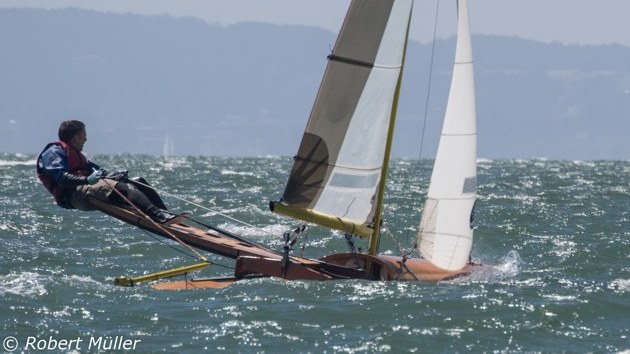
Ulrike_veerkamp.jpg)
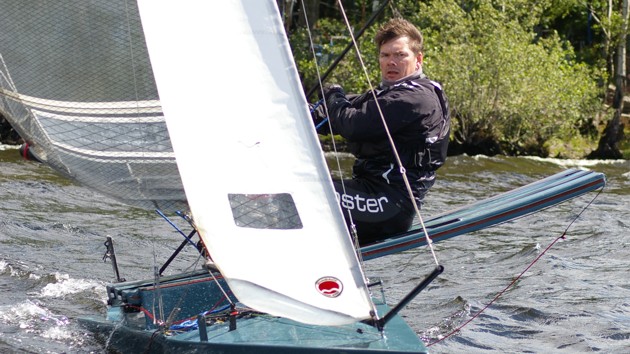
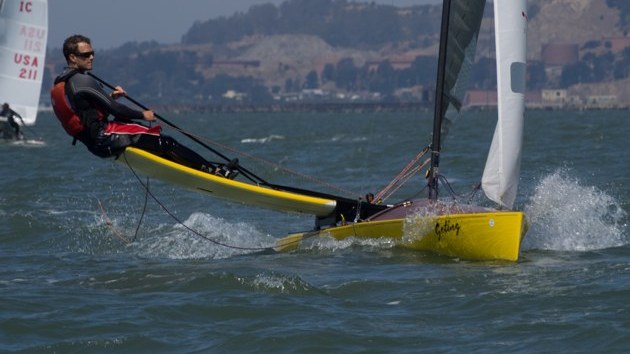



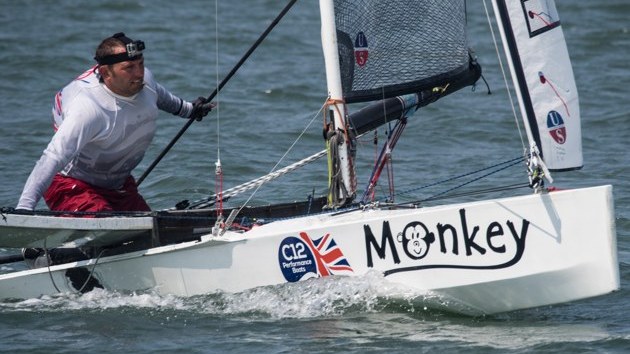
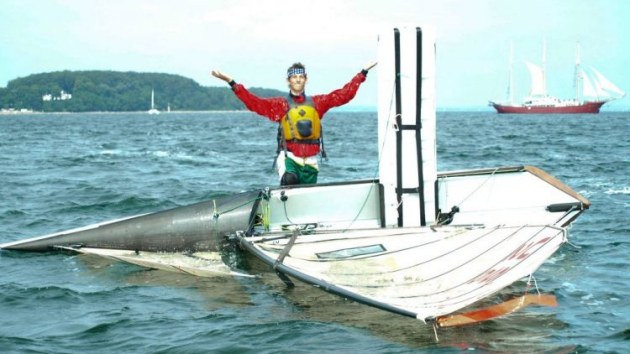
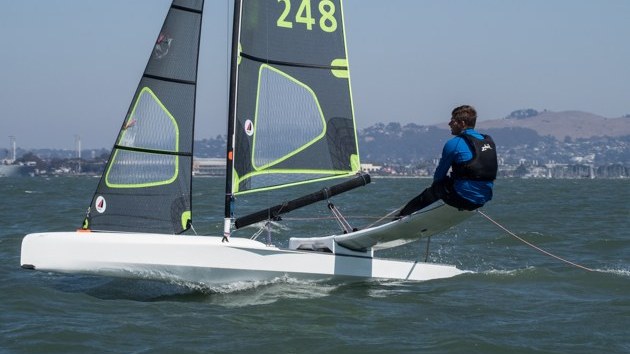
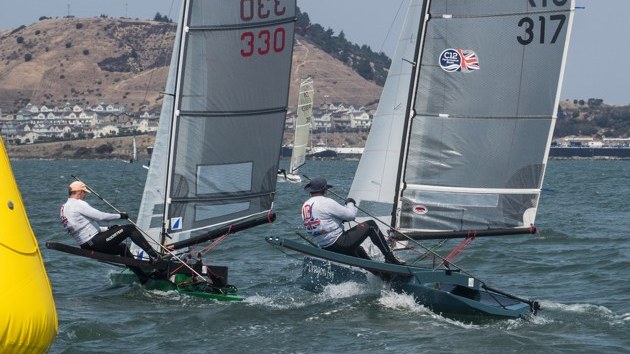
Ulrike_veerkamp.jpg)
